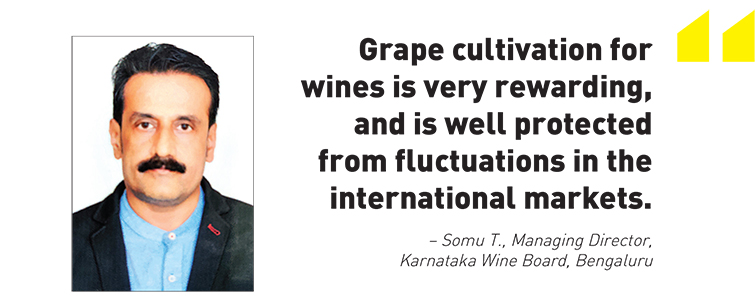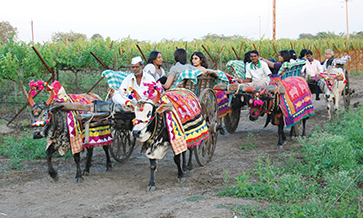The hot tropical belt accounts for 70% of all viticulture in the country. It extends from Nashik and Solapur in the west, through Vijayapura, Belegavi and Gulbarga in the centre, and on to Mahbubnagar and Medak in the east.
Karnataka offers the best terroir for grapes in India and the state government was alert to its ramifications for horticulture, wine making and business. Therefore, it announced a Wine Policy in 2007, following up with establishing the Karnataka Wine Board the next year.
To date it is the only wine board in the country, and is mandated to promote R&D in viticulture, streamline farming practices, and help build a ‘wine culture’ through awareness and education about the benefits of wines.
According to Mr Somu, Managing Director of Karnataka Wine Board, in 2008 the state had only two wineries, with a combined annual turnover of Rs 11 crore and production at 13 lakh litres of wine.
Today (2020), there are 15 wineries churning out 93 lakh litres of produce and a combined annual turnover in excess of Rs 258 crore. The area under grape cultivation in Karnataka today stands at 18,000 hectares.
Govt mandate
The Wine Board is tasked with rendering technical advice to farmers and wineries through seminars, workshops and farm demonstrations. The second, and equally important, task is organising the Bangalore International Wine Festival and up to six similar, smaller festivals across smaller towns in the state each year, to promote wine consumption.
The Wine Board has sanctioned a recognised a ‘wine education, appreciation and tasting’ certificate course, which is quite popular aming hotel management institutes across the country.
Karnataka has low taxation on wine, and its Wine Policy promotes boutiques (more than 230 across the state) and taverns (80 in operation) at nominal licensing fees. Taverns are permitted to serve wines by the glass. Occasional licences (limited period) are cheap and easy to acquire.
For grape cultivation, the state’s horticulture department offers a subsidy of Rs 30,000 per hectare per year for farm inputs (seeds, soil nutrition and pest control), apart from another subsidy for installing drip irrigation.
Future plans
The Wine Board has helped acquired a Geographical Indication tag for Bangalore Blue grape variety, which is indigenous to about 4,000 acres in Kolar district.
The state government is planning a 141-acre ‘Wine Park’ near Torvi village of Vijayapura district. It is located in the tourism hub of Badami, Aihole and Pattadakal. It will house a “model winery”, an R&D centre for grapes, and fields for trials and demonstrations, says Somu.
In the future, the Karnataka Wine Board will also experiment with jamun, guava, pineapple and pomegranate to make fruit wines, he adds. Now, that’s something we will all look forward to!















